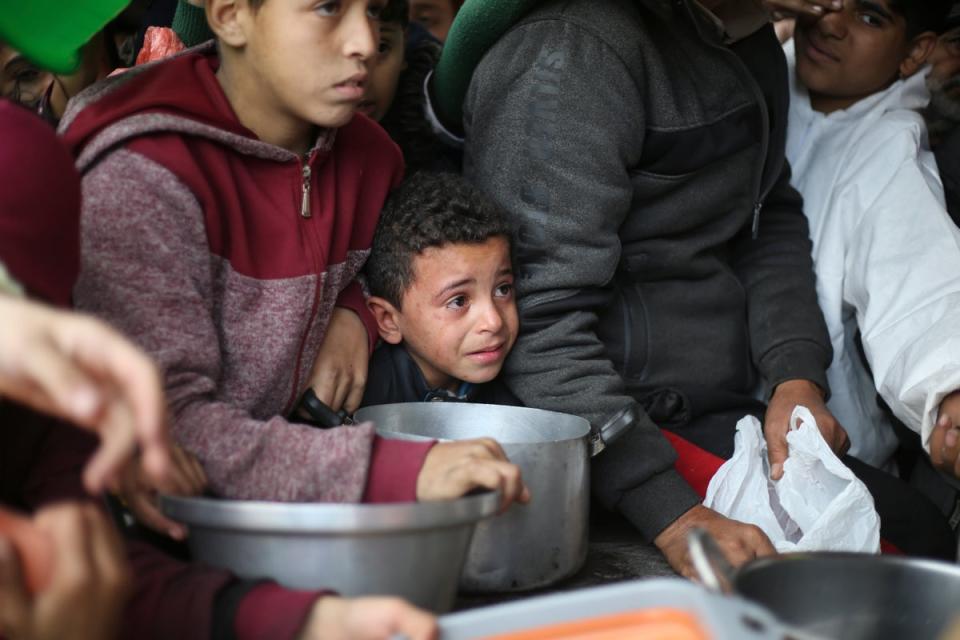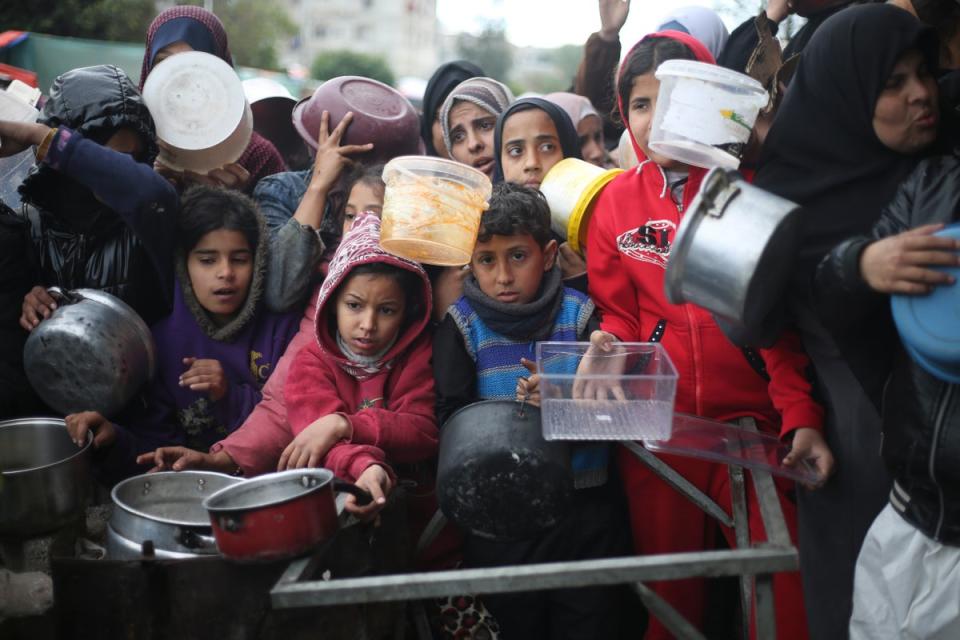‘People will die’: Hundreds of thousands of lives at risk in Gaza after Biden pauses UNRWA funding
Hundreds of thousands of people in Gaza are starving as a result of Israel’s war against Hamas, according to aid agencies on the ground. But an even greater number of Palestinian lives may soon be at risk due to a decision by the US and its allies to freeze funding to the primary aid agency operating in the territory, following reports that a small number of employees were involved in the October 7 attacks.
Now, the agency has warned it may run out of money as early as this month, a worst-case scenario that aid groups have warned could cause widespread famine and death.
“They will die of hunger, they will die because they don’t have the insulin that UNRWA brings in, or they will die because a woman had a complicated childbirth and there was no UNRWA midwife to help her,” said Juliette Touma, director of communications at the United Nations agency responsible for Palestinian refugees, known as UNRWA.
The fate of Gaza’s two million people has long been inextricably tied to UNRWA. Even before the war, it provided the basic necessities for people to survive in the blockaded territory, such as food, medicine and fuel. But today, like the population it serves, it is battling for survival.
The agency has struggled to operate effectively in Gaza since the beginning of the war — which was launched by Israel in response to a surprise Hamas attack on 7 October that killed 1,200 people. The agency received just half of the funds it needed to meet the scale of the humanitarian catastrophe caused by the war. Israeli restrictions on aid deliveries and widespread bombing across the strip have made delivering aid almost impossible, and at least 152 of its staffers have been killed in the bombardment, according to the agency.
UNRWA warned in December that nearly half of Gaza’s population was “at risk of famine” due to the war. Then, last week, its funding was abruptly cut in half when the US and several other countries froze their contributions after Israel said that a dozen of the agency’s staff were involved in the Hamas attack.
As a result of the freeze, and the dramatic increase in the needs of Gaza’s population due to the war, UNRWA could run of out money as early as this month, Ms Touma told The Independent. That would have an unfathomable impact on the already beleaguered people of Gaza.
“In short, people will die totally unnecessarily,” said Ms Touma, adding that everything from food, drinking water, medicine and generators for hospitals would all be impacted by the funding cuts.

Ms Touma recently returned from a visit to Gaza and witnessed the humanitarian crisis first-hand. She describes a landscape of tens of thousands of makeshift shelters and a mass of people moving constantly to escape the bombing and find food. Private enterprise has all but collapsed, and where it does exist, prices are exorbitant. She said that a single egg now costs around 70 US cents.
“It’s as if they’re are operating in this auto mode for survival, fixated with being safe, finding food, finding water, finding a toilet,” she said.
Ms Touma described the people she met as “tired and terrified and anxious.”
Some 80 per cent of Gaza’s population of 2.3 million have been displaced by the fighting. Israel’s offensive is now pressing further south towards the city of Rafah, where most of those displaced people are now sheltering. Other aid agencies have warned that they do not possess the capability to fill the gap left by UNRWA should it halt operations. Today, UNRWA says more than 500,000 people in Gaza are facing “catastrophic hunger,” and the risk of famine increases every day.
“This is why these decisions are shocking, because they come at a time when we are at very high risk of famine, especially in the northern parts,” Ms Touma said. “There is an ongoing war and the UN is running one of the largest humanitarian and most complex operations, so this comes in the middle of that.”
UNRWA, or the UN Relief and Works Agency for Palestine Refugees in the Near East, was founded in 1949 to provide specifically for the Palestinians who either fled or were forced from their homes by Israeli forces during the 1948 Arab-Israeli war. Today, it supports some six million Palestinian refugees across the occupied West Bank – including East Jerusalem, the Gaza Strip, Syria, Lebanon and Jordan.
My colleague @AndrewFeinberg questions the White House on the suspension of funding for UNRWA, the Palestinian refugee agency, at a time when aid agencies are warning of famine in Gaza. pic.twitter.com/Ddq2rYE1bc
— Richard Hall (@_RichardHall) January 31, 2024
The allegations about a dozen staffers from the agency being involved in the October 7 massacres came to light more than three months after the Hamas attack. UNRWA itself was the first to announce the news, on 26 January, that Israel had provided it with information that 12 of its 13,000 staff operating in Gaza were involved in the Hamas attack and kidnapping of some 240 people in southern Israel.
Israel alleges dozens more are affiliated in some way with Hamas and its ally, Palestinian Islamic Jihad. At a briefing with UN ambassadors last week to discuss the allegations, Israel’s defence minister Yoav Gallant said that UNRWA had “lost its legitimacy to exist”.
The agency’s chief, Philippe Lazzarini, said he had terminated the contracts of those suspected, launched an investigation into the “shocking” allegations and declared that “any UNRWA employee who was involved in acts of terror will be held accountable, including through criminal prosecution.”
The announcement came on the same day that the International Criminal Court (ICJ) found that it was “plausible” that Israel has committed acts of genocide against the Palestinians.
The US, Germany, the UK and eight other donors immediately paused funding to UNRWA pending an investigation. UNRWA estimates that about $440 million in funding is at risk. The US provided about $344 million of funding in 2022, making it by far the largest donor.
The State Department said that most of its 2023 funding had already been allocated, but its freeze means that Congress cannot allocate any further funds, which had been due to happen this summer. Even then, the funding would face stiff opposition in Congress, where Republican and Democratic senators this week agreed on a bipartisan deal that would bar all funding for UNRWA to be permanently withdrawn in light of the allegations, while delivering $14.1bn to Israel.
Senator Bernie Sanders, meanwhile, was among the few voices calling for an immediate restoration of funding, warning that “hundreds of thousands of children face starvation and disease” as a result.

“Obviously, it’s not acceptable for any of the 13,000 UNRWA employees in Gaza to be involved with Hamas, and allegations against the 12 people charged must be investigated. However, we cannot allow millions to suffer because of the actions of 12 people. The US and other countries must restore funding to stave off this humanitarian catastrophe,” he said in a statement.
US Secretary of State Antony Blinken said of the allegations that “we haven’t had the ability to investigate [the allegations] ourselves. But they are highly, highly credible.”
A UN oversight agency is currently conducting an investigation into the allegations and expects to provide a preliminary report in several weeks, but the US has not been clear about what it would take for the funding to be restored.
White House National Security Council spokesman John Kirby that the US “absolutely shares those concerns” about the risk of Gaza’s humanitarian crisis being exacerbated by the shortfall in US funding for UNRWA when questioned by The Independent.
“We’re concerned about that, no question about it. Now, look, we suspended funding temporarily to UNRWA as they do this investigation. We believe it was the right thing to do to stop that funding while they investigate and we’ll see how that investigation goes. We’ll see what they learn and we’ll see what accountability measures they put in place,” he said.
The UN is now rushing to solicit funding from alternative donors to prevent the halt of its operations. The most serious risk is a widespread famine in Gaza, but the agency also provides schooling and medical care to millions of Palestinians across the region.
Ms Touma said the halting of UNRWA operations would be a “bleak day, not only for Palestinian refugees or people impacted by the war in Gaza, but for the whole region.”
“UNRWA is a fundamental player and a contributor to the stability in a region that is a tinderbox. No UNRWA means further instability,” she said.


